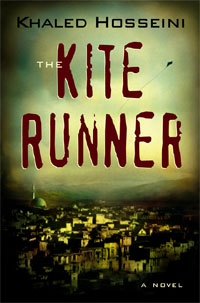The Kite Runner ~ Khaled Hosseini
So,I thought and started with reading The Kiterunner by Khaled Hosseini as my Thanksgiving book this year. This harrowing, moving story, The Kite Runner reflects on life in pre-war Afghanistan, the country's culture and customs, the devastation that follows, and the immigrant experience in the United States, well, these words may have taken you to think that there is a very suspensful, deeply moving personal tale of an immigrant. This is, apparently, the first Afghan novel to be written in English and it is indeed a most distinguished beginning and it’s a must-read one!!
In The Kite Runner by Khaled Hosseini, not only do we get a rare glimpse into a fascinating and sometimes tragic childhood in a foreign land, but that land also happens to be very significant to current events in the United States in the 20th and 21st centuries. Looking at The Kite Runner as a story about culture, however, misses what the book is really about. This is a novel about humanity. This is a story about friendship, loyalty, cruelty, longing for acceptance, redemption and survival. The core story could be set in any culture because it deals with issues that are universal. The author, KHALED HOSSEINI, is an Afghani who has lived in America since his family received political asylum in 1980, is a skilled and gifted writer.

Amir and Hassan are best friends who grew up in Afghanistan’s capital, Kabul. Amir’s father, a widower, is a wealthy and powerful man, and one Amir is forever trying to please and gain more affection from. Hassan, a "mere" servant's son, seems to gain that affection with less effort, and his son wonders, "Why?"
A devastating, secret event and the war in Afghanistan separate these two friends, leaving Hassan behind as Amir departs for the United States. Through the contrasting experiences of life in a more glamorous pre-war Afghanistan compared with a modest existence in the States, we see, taste and feel what the journey has been like for many Afghani immigrants who have come to the new world. Remembering his old friend and coming to grips with the tragedy that left him full of guilt and shame, Amir's personal journey, however, has only just begun.
The Kite Runner looks at how the main character, Amir, deals with a secret in his past and how that secret shaped who he became. It tells of Amir's childhood friendship with Hassan, his relationship with his father and growing up in a privileged place in society.
Amir always wanted to be thought well of by his towering father, who was the sort of man brave enough to risk being shot by a Russian soldier in order to defend a young woman from rape. Amir’s Baba had servants, the polio-afflicted Ali and his cleft-lipped son Hassan, Hazaras who were teased mercilessly by the older children of the area, and persecuted because of their perceived lower status in the Afghan community. But Ali and Baba were more than servant and master: they grew up together, and the bond between them was very strong. Hassan's mother ran away five days after the birth, and Amir's mother bled to death after he was born: the two boys were nursed by the same woman, at Baba's instigation, forging another bond that is not easily broken. So, the bond of friendship was inherited in the next generation.

But Amir was sometimes cruel to Hassan, just as much as he valued his friendship, and loved him in his own way. Hassan stood up for Amir time and again, but Amir failed his friend, and on one particular day, the day of the famous kite-flying contest, he failed him in a way, which haunts him for years to come. The kite flying contests occurred every year in their neighborhood, and the crucial one which forms the moral centrepoint of this novel is in 1975, when Amir was thirteen. Amir was a deeply flawed young man, lacking the courage which his father possesses so abundantly, and yet he was very adorable and sympathetic.
The Soviet invasion of Aghanistan sends Amir's family to the United States, but he returns there as an adult during the Taliban rule to atone for his sins to Hassan because at one point of time in everyone’s life, this moment comes when you realize the aftermath of the actions of the past.
The narrative makes integral the political events occurring throughout the time period from the 1970s through to 2001, so that we get an idea of the effects wrought by the Russian invasion, the Mujaheddin and the Taliban. Hosseini is capable of writing very moving, but unsentimental prose, particularly about people struggling to make a life despite gross adversity. He is able to meld the global political with the local everyday survival of those caught up in horrendous upheavals and the destruction of their country, livelihoods and families.
Through this story, you will get the feeling of what it is like to be an Afghan, to see one's beautiful country destroyed, to live in fear. The author is able to depict moral complexities and catches the breath, and heart, of the reader. I would advice everyone to read this book, which has a plethora of activities, folded in it and the more you open each chapter of the book, the more you get inside the strong morale of the story that conveys the following:
· Themes that touch all humanity - love, cruelty, redemption
· A setting worth learning about - Afghanistan from the monarchy through the Taliban
· A page turning, heart rending story of friendship and secrets
So, are you in the gang to read the book??? Ciao.. with your feedback :-)






